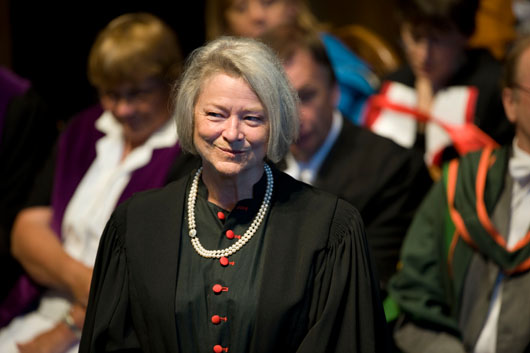Laureation address – Kathryn Adie

Kathryn Adie
Honorary Degree of Doctor of Laws
Laureation by Professor John Anderson
School of International Relations
Tuesday 22 June 2010
Vice-Chancellor, it is my privilege to present Kate Adie for the Degree of Doctor of Laws, honoris causa.
It is with a certain anxiety that I embark upon this address. From the 1980s until the present, many faithful viewers of BBC news have associated Kate Adie with conflict and violence, with trenches and flak jackets, and with considered reporting on the sheer nastiness of warfare. In consequence there remains the fear that should a car back-fire on North Street, she will flee the hall in pursuit of a story before we have time to confer this degree.
Kate Adie was born on 19 September 1945 and grew up in Sunderland. After taking a degree in Scandinavian Studies at Newcastle University she worked for the BBC at various local radio stations, before joining the national news team. Her shift from the local to the international was marked in part by an accident of fate. She was on duty the night that the SAS stormed the Iranian embassy to resolve a hostage siege in 1980, reporting the whole event live from behind a car door. In subsequent years she travelled to numerous conflict zones around the world, covering, amongst other things, the Falklands War, the Northern Ireland conflict, the American bombing of Tripoli, the Lebanese civil war, the Armenian earthquake, the Tiananmen Square massacres, the first Gulf war, the Yugoslav civil war, and the Rwandan genocide. Accounts of these and other assignments can be found in her 2002 autobiography The Kindness of Strangers.
If you have not read this, go out and buy it for the journey home. Apart from the author’s facility with the English language, something that many academics could learn from, it is simply a joy to read. There is no false heroism here. Instead we have the reality of violence, a sense of the sheer madness of so much conflict, a rejection of any notions of war as glorious, and a very human desire to get out alive. All this is told with humanity and with lots of humour, both from Kate Adie and from some of those most directly affected. Many of us have tales about tricky flights and landings but few can compete with her flight into war-torn Beirut where the pilot made the following announcement:
Ladies and gentlemen, we are on final approach to Beirut airport. As there is a little activity involving rockets… please be so kind as to leave your hand baggage behind… When the aircraft touches down it will taxi very near to the terminal. Please make your way to the door at the front of the aircraft, then run like hell.
You might guess that the last word was a little stronger, but the story is told as if this was a very ordinary day in the life of this extraordinary journalist.
In 2003 Kate Adie stopped reporting directly from conflict zones and today she works primarily as a freelance journalist and presenter of Radio 4’s ‘From our own correspondent’. In 2003 she published Corsets to Camouflage, about women and war, and, in 2005, Nobody’s Child, which explored the experience of foundlings and adoptees. Her most recent book explores the stories of those who risk their lives for work, from the bomb disposal expert to the food taster.
During the course of her career Kate Adie has picked up many awards, including the Richard Dimbleby award in 1990 and an OBE in 1993. She has also acquired several bullet wounds, and has been attacked by both Norman Tebbit and Alistair Campbell, a sure sign of distinction given the tendency of politicians to forget that upsetting governments by telling the truth is an essential function of a free press. She can sometimes give as good as she gets, and the autobiography includes the rather unlikely account of her punching a nun in Northern Ireland (not unprovoked) and flattening several Chinese security officers in her attempts to get her tapes of the Tiananmen events to the BBC. She also has plenty to say about the managerialism that infested the BBC from the late 1990s onwards, and some of her acerbic comments about the growing emphasis on relevance and utility have a particular resonance for an academic audience.
I am sure Kate Adie would be the first to credit much of her success to the colleagues and teams she has worked with, but there is a lot more that comes from hard work, professionalism, an ability with words, a determination to ‘tell it as it is’, and a passionate sense of the absurdity and injustice of war.
Vice-Chancellor, in recognition of her major contribution to British and international journalism, I invite you to confer on Kate Adie the Degree of Doctor of Laws, honoris causa.
Category Community